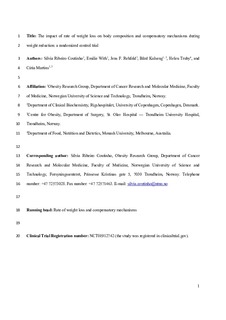The impact of rate of weight loss on body composition and compensatory mechanisms during weight reduction: A randomized controlled trial.
Coutinho, Silvia dos Santos Ribeiro F; With, Emilie Føyen; Rehfeld, JF; Kulseng, Bård Eirik; Truby, H; Martins, Catia
Journal article, Peer reviewed
Accepted version
Permanent lenke
http://hdl.handle.net/11250/2489087Utgivelsesdato
2017Metadata
Vis full innførselSamlinger
Sammendrag
Background & aims
Rapid weight loss (WL) has been associated with a larger loss of fat free mass and a disproportional reduction in resting metabolic rate (RMR), but the evidence is inconclusive. We aimed to evaluate the impact of WL rate on body composition and compensatory mechanisms activated with WL (reduced RMR, increased exercise efficiency (ExEff) and appetite), both during negative and neutral energy balance (EB).
Methods
Thirty-five participants with obesity were randomized to lose a similar weight rapidly (4 weeks) or gradually (8 weeks), and afterwards to maintain it (4 weeks). Body weight and composition, RMR, ExEff (10, 25 and 50 W), appetite feelings and appetite-regulating hormones (active ghrelin, cholecystokinin, total peptide YY (PYY), active glucagon-like peptide-1 and insulin), in fasting and every 30 min up to 2.5 h, were measured at baseline and after each phase.
Results
Changes in body weight (≈9%) and composition were similar in both groups. With WL, RMR decreased and ExEff at 10 W increased significantly in the rapid WL group only. However, fasting hunger increased significantly with gradual WL only, while fasting and postprandial prospective food consumption, and postprandial hunger decreased (and postprandial fullness increased) significantly with rapid WL only. Basal total PYY, and basal and postprandial insulin decreased significantly, and similarly in both groups. After weight stabilization and no ketosis no differences between groups were found.
Conclusions
Despite differences while under negative EB, WL rate does not seem to have a significant impact on body composition or on compensatory mechanisms, once EB is reestablished.

